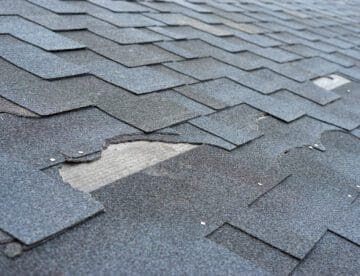Re-roofing a typical home involves a lot of work, but it’s not a complex process, in most cases. Still, you will want to ensure that the whole project goes according to plan. A key part of that plan is having a contract that describes in reasonable detail the work to be done. So what should a roofing contract include?
Business information
All pertinent business information should be included so you can verify the information. Your contractor should have a contractor’s license number, so you can check that number against the names of the people you are dealing with. Construction businesses are often sold to the next generation in the family, so you can verify that chain through their contractor number. And you should. By doing this, you can discover if this is an established business that’s recently been sold, but has kept the legacy name. We’re not saying that there’s anything wrong with this practice, just that you should be told upfront if you’re dealing with a new owner.
The Better Business Bureau and Chamber of Commerce are two other points of contact, and we would use those resources if possible.
Scope of work
What work, in detail, will the contractor be doing? Here’s what the roofing contract will usually spell out:
- Will the job include the removal of old shingles?
- What’s the square footage of the roof for removal and new roofing?
- Will the job include repair of facia, trim, etc.?
- Will the job include replacement of drip edge, vents, boots, and flashing? This is typical, but it’s up to you.
- Will the contractor rent and manage a dumpster for waste disposal? Is site cleanup after completion part of the job?
- You’ll also want to confirm that your contractor has pulled the building permit, which is probably required for your project.
Timeline for Roofing Contract
The project timeline can be a source of friction between a contractor and homeowner. If your project doesn’t start the day, or week, when you’re expecting to see some work done, you might start to get cranky. But some things, after all, are under no one’s control. Storms are one example, and COVID is another. Your contract should clearly state a project timeline, with reasonable accommodations for delays. If you’re getting a project done and have a hard deadline, such as a party or wedding to accommodate at the home, make it easy on yourself. Give yourself at least one month of extra time for the project. Both you and your contractor will feel more relaxed when your backs are far from the wall.
Materials list
This section tells you specifically what materials will be used for your new roof. That will include the brand and item number for the shingles, tar paper or peel and stick membrane, ridge vent, and whatever else is part of the job. It’s a good idea for you, as the homeowner, to know what you’re getting and be satisfied. Miscommunication leads to conflict. For example, what if you thought you were getting full coverage ice and water barrier, and the contractor installs roofing felt. Not good, and not readily fixable. Go over all details before signing the contract.
Installation methods
This section should be fairly straightforward. Your contractor will have standard methods for each type of material. What stands out here, though, is basic but crucial standards, such as the number of nails used per shingle, for example. That number can make or break your warranty. A reputable contractor will use industry standard practices with no exceptions.
Warranty
Your roof warranty is a big deal, so make sure you and your contractor spend the necessary time so you understand it fully. For the contractor, he’s done this so many times that he knows it backwards and forwards. For you, though, especially if you’ve never replaced a roof before, you’ll need to understand multiple parts, including:
- Material warranty on manufacturing defects
- Extended/lifetime material warranty on manufacturing defects
- Wind/uplift warranty
- Labor/workmanship warranty
- Here’s a more in-depth look at warranties.
Unexpected Circumstances: What Happens Next
When roofing contractors consider unexpected circumstances, it’s usually something about water or other damage to the roof decking or framing. We’re talking about problems that were not possible to discover or anticipate. This type of occurrence should be addressed explicitly in the contract. If there’s rotting decking, for example, your contractor knows the additional cost to replace it. It’s a simple addition.
Other circumstances, like labor shortages, are tougher to correct. Labor shortages can have a ripple effect, where every job is late and taking longer than it should. Your project may very well go as planned, but just consider in advance what you might have to deal with.
Option to Terminate
There can be any number of reasons why you’d need to terminate the roofing contract, so make sure you are covered. What if you lost your job suddenly? Or what if your car died? It could be anything, but take a little time and envision what would make you back out of getting a new roof. Add that to the contract in good faith and you’re set. This addition can be as simple as printing an addendum to the contract and having both parties sign it. Make sure you reference the addendum on the main sheet of the contract, next to your signature.
Deposit and payment schedule
Your proposed contract will include all the preceding items, and will also probably include a deadline for accepting the terms and signing the contract. The schedule noted in the contract will go into effect when you sign. Most roofers will give you a few days to consider, but as they’re working to minimize gaps in their installation schedule, it won’t be long.

A common approach for roofers is to take a deposit for part of the total cost as listed in the contract when you commit and sign. The next milestone is often the delivery of materials, when you’ll pay another chunk of the total. The final payment is often due when the crew is done, the site is cleared, the dumpster is gone, and you can look at your new and snazzy roof. When you work with a professional roofing contractor, this is a great day for both parties. You’ve gotten the new roof your home needed, and you’re protected for many years. The contractor has the money that he and the crew have earned, and now he can pay his bills and move on to the next project.
We’re Here When You Need Us
Any reputable contractor will show you their standard roofing contract and take the time to go through it with you line by line. Also, you have the right to have an attorney read your contract before you sign. When you’re ready for a consultation for your roof, give us a call at 813-373-9088. Our team has more than 40 years of experience in roofing. You can also use this form and we will contact you.



